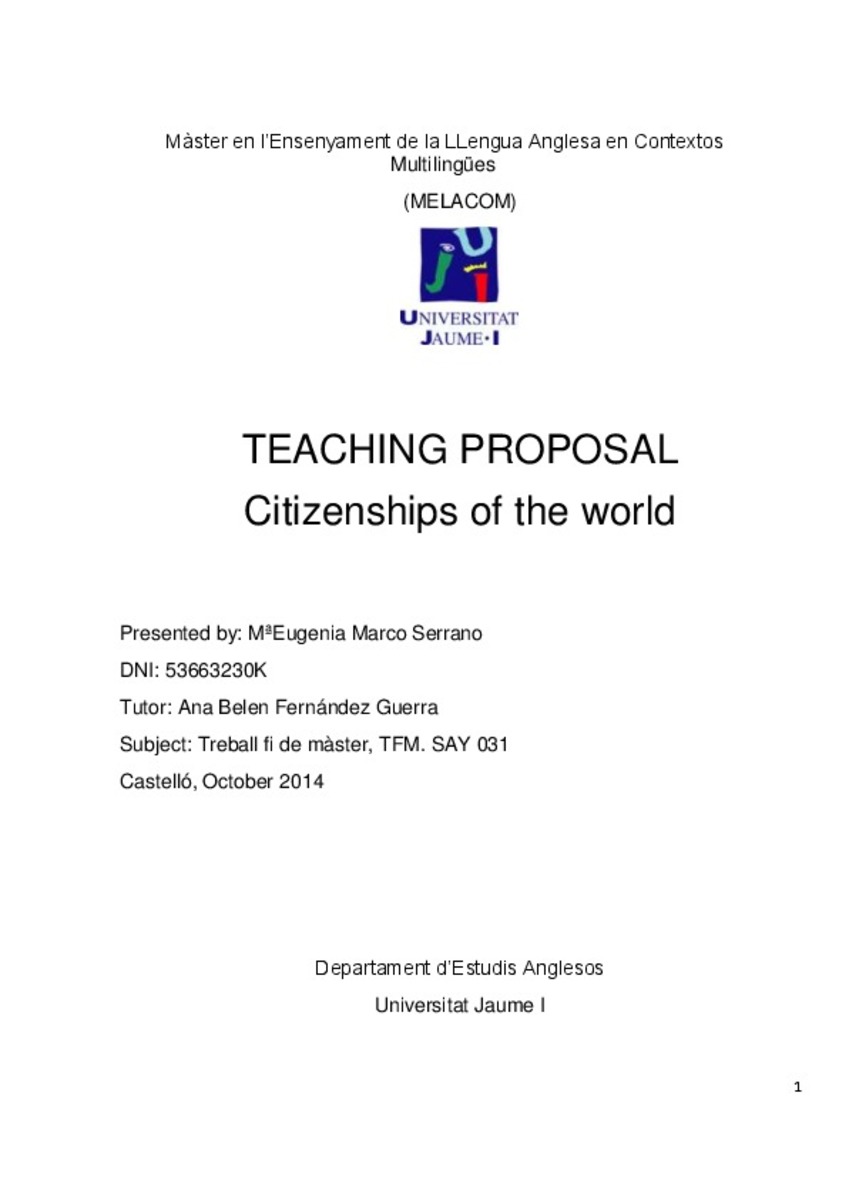Mostrar el registro sencillo del ítem
Teaching proposal : citizenships of the world
| dc.contributor | Fernández Guerra, Ana Belén | |
| dc.contributor.author | Marco Serrano, María Eugenia | |
| dc.contributor.other | Universitat Jaume I. Departament d'Estudis Anglesos | |
| dc.date.accessioned | 2014-12-05T12:57:47Z | |
| dc.date.available | 2014-12-05T12:57:47Z | |
| dc.date.issued | 2014 | |
| dc.identifier.uri | http://hdl.handle.net/10234/110804 | |
| dc.description | Treball Final de Màster en Ensenyament i Adquisició de la Llengua Anglesa en Contextos Multilingües (Pla de 2013). Codi: SAY031. Curs: 2013/2014 | ca_CA |
| dc.description.abstract | The past decades have seen the rapid development of English teaching and learning in the field of Second Language Acquisition. For many years, it has been supposed that learning a language was based on its rules and only by knowing them, it was enough, but in Nunan's words: "Learning a language involves more than simply learning grammatical patterns and rules" (Nunan, 1988:21). This idea has been supported for more than thirty years. Nevertheless, we can still find in our schools hat this is not completely accurate. Many teachers keep thinking that it is enough to learn English through grammar and vocabulary. Over the last decades, language teaching has brought about a change in many parts of the world, but not in Spain. There are thousands of ways to teach and it is not accepted anymore that there is such a thing as the 'right method' to learn a language, so we need to adapt us to each student and his/her needs. But, we need to bear in mind is some ideas when teaching. First of all it is important that they learn to communicate themselves; any language is used by its speakers to express themselves, to interact with others, to gain information, and to learn about the world around them. Second, as it is known, language varies; speakers need to vary language use according to the context of communicative interaction, i.e. language varies with variation in topic, participants, setting, purpose, and medium (verbal or written). Moreover, language varies according to academic areas and tasks. Third, and as an essential part in this work, language learning is most effective when it takes place through meaningful, interactive tasks. Language learners will thus learn most when they are engaged in meaningful, purposeful activities of social and cognitive nature in the context of the classroom and outside it. Finally, and equally important for this paper, learning a new language is becoming familiar with a new culture. Learners of a new language become aware of new values, norms, thought patterns, and beliefs. As a result of this cultural exposure learners develop understanding of, respect for, and appreciation of diversity of cultural backgrounds. In this paper these ideas will be central. Due to in my teaching practice I did not have the opportunity to implement the activities as I would like to do it. Therefore, I have proposed two didactic units to approach the contents from the book I worked with during my teaching practice. One didactic unit is for fourth of primary, and other for third of primary. So, below, the theories I have used to support my teaching proposal are explained. Then, my teaching proposal will be exposed and related with the theories from the theoretical framework and from the Melacom Master. | ca_CA |
| dc.format.mimetype | application/pdf | ca_CA |
| dc.language.iso | eng | ca_CA |
| dc.publisher | Universitat Jaume I | ca_CA |
| dc.rights | Attribution-NonCommercial-ShareAlike 4.0 Spain | * |
| dc.rights.uri | http://creativecommons.org/licenses/by-nc-sa/4.0/ | * |
| dc.subject | Màster Universitari en Ensenyament i Adquisició de la Llengua Anglesa en Contextos Multilingües | ca_CA |
| dc.subject | Máster Universitario en Enseñanza y Adquisición de la Lengua Inglesa en Contextos Multilingües | ca_CA |
| dc.subject | University Master's Degree in English Language Teaching and Acquisition in Multilingual Contexts | ca_CA |
| dc.subject | Enseñanza del inglés | ca_CA |
| dc.subject | Enseñanza de lenguas | ca_CA |
| dc.subject.other | Anglès | ca_CA |
| dc.subject.other | Llengua segona | ca_CA |
| dc.title | Teaching proposal : citizenships of the world | ca_CA |
| dc.type | info:eu-repo/semantics/masterThesis | ca_CA |
| dc.educationLevel | Estudios de Postgrado | ca_CA |
| dc.rights.accessRights | info:eu-repo/semantics/openAccess | ca_CA |
Ficheros en el ítem
Este ítem aparece en la(s) siguiente(s) colección(ones)
-
TFM: Màster Universitari en Ensenyament i Adquisició de la Llengua Anglesa en Contextos Multilingües [98]
SAM031; SAM032; SAY031; SAY531








